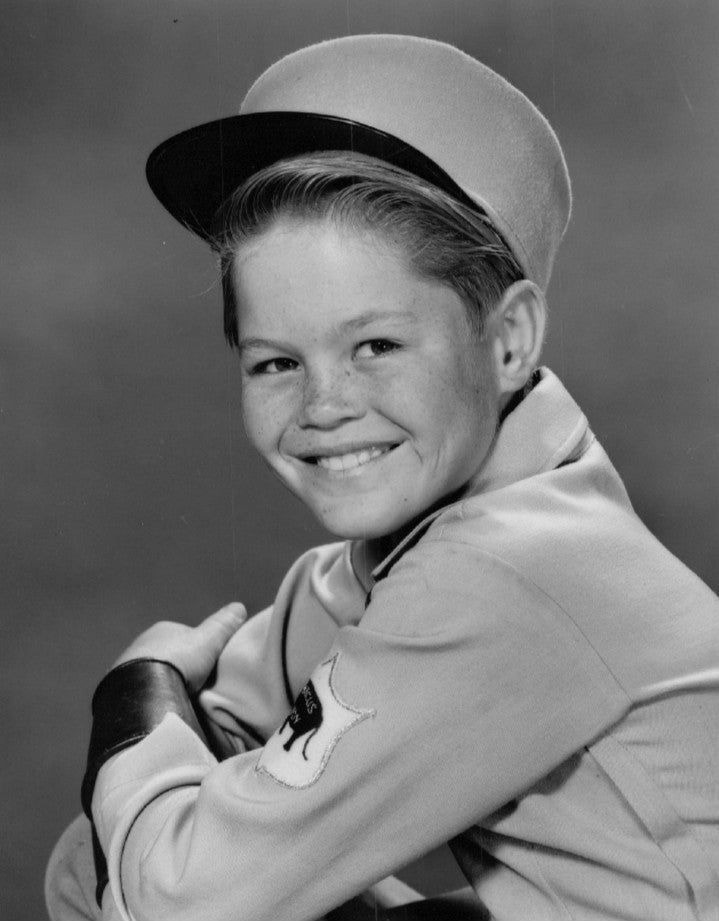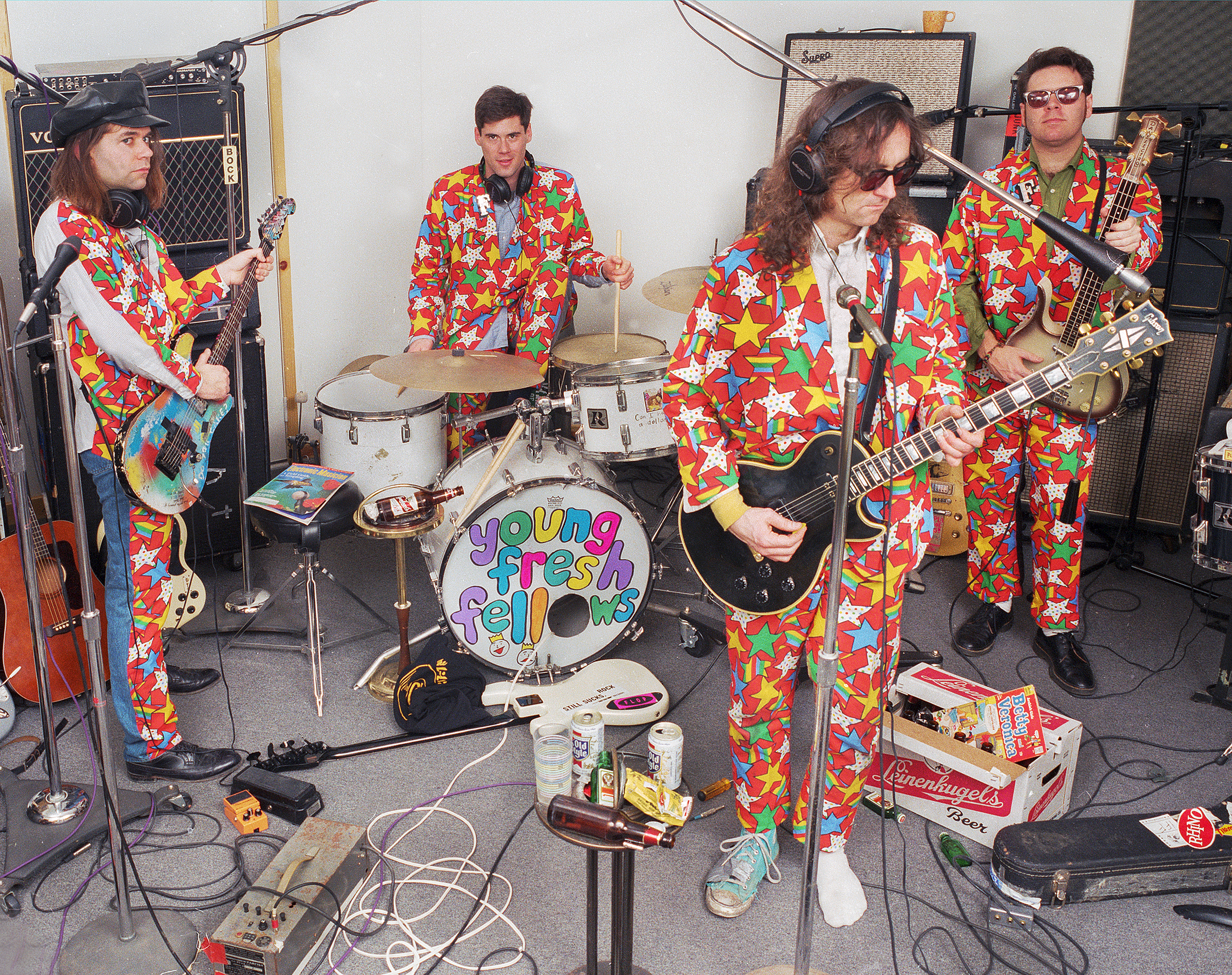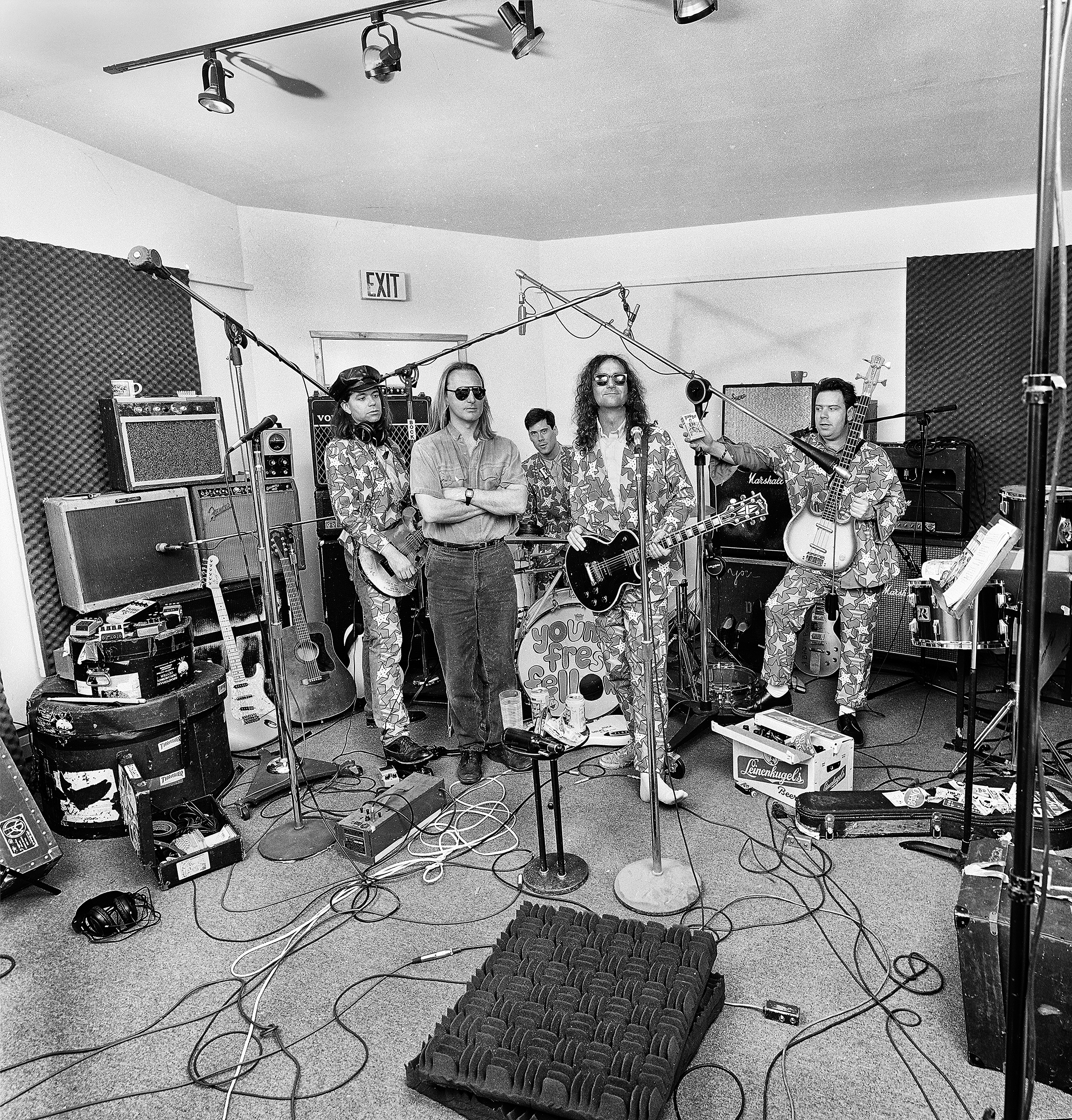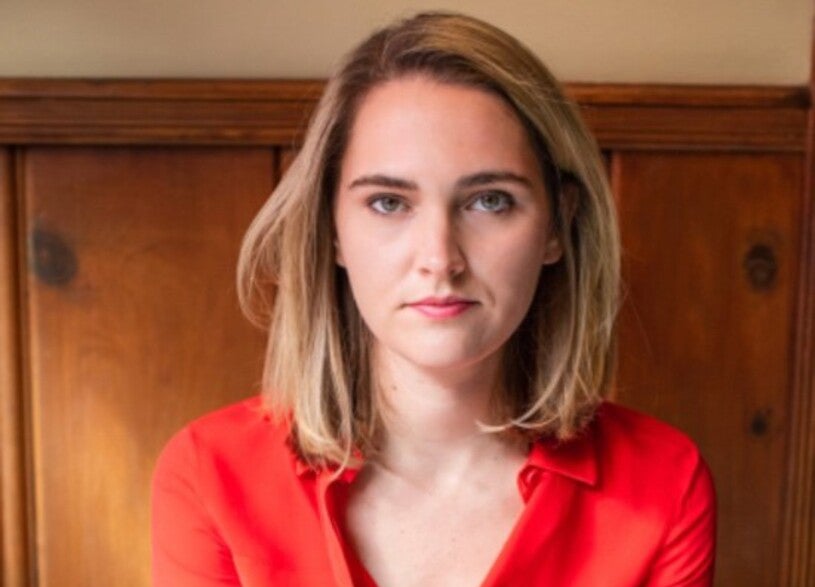Comedian Jena Friedman on her hilarious and ironically named essay collection, “Not Funny.” And, The Monkees’ Micky Dolenz reveals what it’s like to be the last remaining member of the iconic band. Also, Scott McCaughey, the man of many bands, including R.E.M., stops by to talk about his prolific career.
Featured in this Show
-
Jena Friedman conquers another medium with 'Not Funny'

You may be familiar with Jena Friedman as the host of the smart, darkly comedic yet thought-provoking TV series, “Indefensible” and “Soft Focus.”
Or perhaps you’re familiar with her work as a standup with her special, “Ladykiller” or her work with “The Daily Show.”
Now Friedman is turning her attention to a new outlet with the essay collection “Not Funny: Essays on Life, Comedy, Culture, Et Cetera.” Pivoting from joke writing to non-fiction is a whole other beast, she told WPR’s “BETA.”
“I think writing essays, especially when they are earnest, there’s a vulnerability to it and I think that exposes you a little bit more,” she said. “Whereas like with a joke, you can hide behind it. But if you’re writing an essay about something, you’re exposing yourself in a way that I’m not totally used to.”
Friedman also admitted that essay writing, or perhaps getting started on essay writing, is her biggest hurdle.
“I think a lot of comedians and performers, you kind of become a performer because it’s easier to do that than sit down and write,” she said. “It’s my Achilles heel. It feels like pulling teeth to sit down and write a first draft.”
Fans of Friedman’s trademarked edgy, sometimes offensive but always sharp satirical style will find lots to enjoy here, as even the origin story of the title is layered.
“I got into comedy by writing an academic paper about comedy, which was very not funny,” Friedman said. “I just think the term ‘not funny’ is so funny to me because it’s so subjective and random, and I just thought it would be a really fun title for the book.”
The title also turns the tables on the backlash she’s received to her satirical tweets that some feel went too far and dubbed “not funny.” Plus, there’s also a practical reason for it, Friedman said.
“If you’re not a fan of my comedy, and you Google my name and ‘not funny,’ a link to the book will come up,” she quipped.
A standout essay is one titled “An American Girl’s Story.” It was inspired by backlash that the Middleton-based doll company American Girl faced in 2005. By then, American Girl had been sold to Mattel and the fictious backstory they created for their doll Marisol Luna disparaged an actual Chicago-area working class Mexican neighborhood.
“It was funny that there was so much controversy around this doll company, but also the company itself, just how tone-deaf they were. It just was perfect comedic fodder to make fun of them,” Friedman said.
Friedman, who was writing political sketches for a small Chicago theater company at the time, constructed a concept and extended sketch of a satirical doll company called “Refugee Girl.” The bit was similar to the famous Garbage Pail Kids satirical swipe at the Cabbage Patch Kids doll line.
“It was like this overly earnest company that had all these refugees from all over the world. And I wrote a play and I got all my friends in Chicago to trust me, to perform in my play. And we put it up. And the whole experience was wild,” Friedman said.
Each week, Friedman would perform in a series of sketches, each as a new doll in the “Refugee Girl” line. She would provide her own hilarious, satirical and equally tone-deaf backstory to dolls like “Fallujah Jones,” an Iraq war refugee settling on the west side of Chicago to teach little kids about “Western neo-imperialism from the safety and comfort of her pink-and-white Laura Ashley bedroom.”
Friedman’s ability to offer up sharp social criticism effectively is on display in the essay “Brief Interviews with Hilarious Men.” The title itself is a play on David Foster Wallace’s famous short story collection, “Brief Interviews with Hideous Men.”
In the essay, Friedman interviews several of her fellow comedians like Bob Odenkirk, Fred Armisen and her old Daily Show boss, Jon Stewart, and gender swaps the inane questions she and her fellow female comics have faced for years.
“I remember seeing a video of Merrill Markoe in around 1980 and the interviewer said, ‘Do you think women can be pretty and funny?’” she said.
Friedman herself recounts receiving similar questions as recently as 10 years ago.
“It has gotten better, but we still get questions that I think when you’re interviewing someone, if you can sit back and say ‘Would I ask a guy the same question,’ and if the answer is no, then you know, that’s a lame question,” Friedman said.
Even the experiment wasn’t on equal ground, though, Friedman explained, because some of the comedians were aware of her premise. She did find a fascinating discovery that some comedians — like Jim Gaffigan and Patton Oswalt who were on tour and answered the questions in writing — had far different takes.
“It was so great that they answered the questions, but it was just funny because so much about comedy is context and tone,” she said. “When you read them, they’re so off-putting, but when you’re actually having the conversation with someone and even like my tone or my inflection and something kind of mitigated any harshness in any of the questions.”
Friedman extends this conceit past gender, to race.
“I think that artists want to be perceived for the work that they do, not their identity for the most part,” she said. “Identity always factors into it. But I remember seeing someone recently emailed me and asked me to weigh in on like Jewish humor, and I just was kind of put off by that.”
“I’m definitely Jewish, but my humor isn’t necessarily about being Jewish,” she continued. “When you talk to anyone, think about just the types of questions that you’re asking and why.”
Friedman said the toughest essay to write in “Not Funny” was one about cancel culture. She feels the discussion about it is so “tedious and exhausting” and struggled to find a unique approach.
“I did kind of come up with my shtick, which is really just that conversations about cancel culture themselves are kind of a grift and like, I want in on it too,” she said.
Friedman plays off of her own experience with a short-lived tenure as a writer for the TV show “Roseanne,” which was canceled after creator and comedian, Roseanne Barr, posted a series of incendiary tweets in 2018.
“It did get me thinking,” she said. “I was able to incorporate my experience working for Roseanne, that brief half day where I was writing on her show before she got canceled, and just weigh in on other things that I actually have experienced firsthand connected to cancel culture.”
“Not Funny” is available from Simon and Schuster.
-
57 years later, Monkee Micky Dolenz is still too busy singing to put anybody down
If there’s one person who really knows that there’s no business like show business, it’s George Michael Dolenz, better known as Micky Dolenz.

Micky Dolenz as a child. Wikimedia Commons When he was only 11 years old, Dolenz played Corky on a children’s TV show called “Circus Boy.” In 1965, he was cast as a member of the TV sitcom “The Monkees,” where he played a member of the fictional band by the same name.
His fellow Monkee, the late Michael Nesmith, said that it was Dolenz’s voice that made the Monkees distinct. And Nesmith was right. Dolenz has one of the most distinctive voices in the history of rock and roll. And even though he is 78, his voice is still as strong as ever.
Dolenz eventually learned to play drums, which came in very handy during the recording of the Monkees’ third album, “Headquarters.”
Dolenz joined Wisconsin Public Radio’s “BETA” via Zoom from his home in Los Angeles to talk about his illustrious career.
“The album (‘Headquarters’) was very special to all of us. ‘Headquarters’ was the first album where we were allowed to go to produce and write and sing and perform on the entire album. Up until that point, we really just had not been allowed to tell the story. Peter Tork told the story, going into one of the early recording sessions in the early days with his bass and they said, ‘What are you doing here?’”
“Headquarters” was the Monkees’ third consecutive No. 1 album on the Billboard 200 charts. It sold 2 million copies within the first two months of its May 1967 release. “Headquarters” only lasted one week at No. 1; it was replaced the next week by the Beatles’ “Sgt. Pepper’s Lonely Hearts Club Band.”
One of Dolenz’s favorite songs on “Headquarters” is “Mr. Webster.”
“And I guess because it’s a story and we didn’t do many songs like that. It reminds me a lot of ‘Rocky Racoon,’ which I sang on the tour when we were doing the (50th Anniversary of) the (Beatles’) ‘White Album’ with Todd Rundgren and Christopher Cross, because I’ve done so much musical theater now in my late, late life. And I love story songs,” Dolenz said.
In 2016, the Monkees released an incredible album called “Good Times!” It was produced by the late Adam Schlesinger of Fountains of Wayne. Dolenz said Schlesinger “enormously” influenced the album.
“He was a tremendous influence, and I was all for it. I’m a singer and I want a good producer and I want good songwriters and I want good musicians, you know?” Dolenz said. “I thought Adam was the perfect choice for it because of Fountains of Wayne. I put myself in his hands, and I was very happy to do that. The album is one of my favorite Monkees albums.”
One of the most powerful songs on “Good Times!” is “Me and Magdalena,” which was written by Ben Gibbard from the band Death Cab for Cutie. It’s a textbook example of how well Dolenz and Nesmith’s voices blend together.
In the summer of 1967 (two summers before the best days of Bryan Adams’ life), Dolenz wrote a song called “Randy Scouse Git.” It was the first song written by Dolenz to be commercially released, and it went to No. 2 on the British charts.
“It was almost this stream of consciousness thing about my experiences there in London in the swinging ’60s when I went over there. The Monkees were huge, and the Beatles threw us a party. And I was in my hotel room at the Grosvenor House. I remember just noodling on the guitar, and I just started singing verses about people,” Dolenz recalled.
“(The lyrics) ‘the four kings of EMI are sitting stately on the floor’ was a Beatles album, ‘Sgt. Pepper.’ (There were) a lot of references to my first wife, Samantha, then being in the limo and not being able to go anywhere and hiding,” Dolenz said of “Randy Scouse Git.”
The English record company wanted to release “Randy Scouse Git” as a single. But much to Dolenz’s surprise, the record company executives wanted to change the title.
“They said, ‘You have to change it (the title) because it’s rude. And I said, ‘Why?’ And they said because it translates into ‘horny Liverpudlian putz.’ So they said, ‘You have to have an alternative title.’ So I said, ‘OK, that’s it: ‘Alternate Title.’ And then it went to No. 1.”
One of Dolenz’s most impressive vocal performances is on the song “Goin’ Down.” You might remember it from season 7, episode 5 of the iconic TV series, “Breaking Bad.” It’s the only song that Dolenz, Nesmith, Tork and Jones collaborated on.
“It was Mike Nesmith who said, ‘Well, listen, why should we do ‘Parchman Farm’ by Mose Allison? Great tune, but it’s a cover. Let’s get somebody to write words for this track. And we went to (singer/songwriter) Diane Hildebrand and she came back with the words. And we played the track and I was going, ‘Floating down the river/with a saturated liver,’ and she said, ‘No, no, Micky. It’s twice that fast.’”
Dolenz says the last time he performed with Michael Nesmith was “poignant.”
“It was the Greek Theater, the last show that tour,” he said.
“Nobody talked about it, but I think everybody kind of felt that it was probably going to be the last time. He had his health issues, quite serious ones,” Dolenz continued. “He was tender. But he was a trooper. He came out and did those shows, even when we would say, ‘Are you sure you want to do the show, you want to go out?’ And he did. He wanted to.”
-
Scott McCaughey is The Man of Many Bands
Scott McCaughey is the man of many bands.
You might know him as the founding member of Seattle’s alternative rock band that made its mark in the ’80s: Young Fresh Fellows. Or you might know McCaughey from his band The Minus 5, or his work as an auxiliary musician in the studio and on stage with R.E.M.
McCaughey’s current band is called The No Ones. R.E.M.’s lead guitarist Peter Buck is one of its members. The No Ones is a bi-continental collaboration that covers a lot of ground including southwest Norway, Athens, Georgia and the Pacific Northwest. And The No Ones cover a lot of ground musically on their latest album, “My Best Evil Friend.”
Besides McCaughey and Peter Buck, the other members of The No Ones are two Norwegian musicians — Arne Kjelsrud Mathiesen and Frode Strømstad. McCaughey and Buck met them while performing in various festivals In Norway.
Strømstad sent a couple of tracks to McCaughey to add a bass track to, “and (Strømstad) was kind of singing on them, going ‘la-de-da-da-da.’”
McCaughey told Wisconsin Public Radio’s “BETA” he asked if the songs had any words.
“And it’s like, ‘Well, not really — kind of, but not really,’” he recalled Strømstad saying.
Strømstad then asked of McCaughey: “‘Do you want to write them?’ I was like, ‘Sure, I’ll try that.’ So it made it more of a collaboration. And we thought, ‘Well, let’s call it a band.’”
Several songs on “My Best Evil Friend” are about being in a band, though McCaughey said this record is more about being a fan of music than about being in bands.
There’s a good chance that McCaughey might hold the record for the number of bands he has been in and continues to be a member of. Is this why so many songs have that theme?
“With The Young Fresh Fellows, my first real band, we did a lot of that right from the get-go. We were singing about being in a band when we weren’t even really a band at that point.”
The fabulous sounds of the Young Fresh Fellows
In 1984, McCaughey and his fellow Fellows released their debut album, “The Fabulous Sounds of the Pacific Northwest.”
It’s a spectacular album, and one of the things that makes is so distinctive is the way the band used sound clips from a Pacific Northwest Bell promotional record with the very same name.
“Chuck Carroll, the original guitarist of The Young Fresh Fellows, had found that record,” McCaughey said. “And we just thought it was super funny because we had just moved to Seattle. So we were sending this tape to all our friends and kind of making fun of the fact that we were in Seattle, and we loved it there.”
In 1989, the Young Fresh Fellows released their fifth album, “This One’s for the Ladies.” One of the songs is a cover version of The Kinks’ “Picture Book” from the band’s 1968 concept album, “The Kinks Are the Village Green Preservation Society.”
The Fellows’ bass player, Jim Sangster, really wanted the band to record a cover version of “Picture Book,” but McCaughey didn’t think he would be able to sing the song. Sangster was adamant, and the result is an excellent cover version and a very creative music video.
The Fellows record with the Viscount of Viroqua, Butch Vig, at Smart Studios in Madison
In March 1991, The Young Fresh Fellows recorded an album called “Electric Bird Digest” here in Madison, Wisconsin, at Smart Studios, which unfortunately no longer exists. And Butch Vig produced this album just a couple of months before he produced Nirvana’s iconic “Nevermind” album.
“He (Butch) was just amazing to work with. We had heard a lot of stuff he did with like Killdozer and Urge Overkill. We really liked the sound he got. And we thought, let’s let’s see how much it would cost to do it. And he was really reasonable. It was just so much fun working with him,” McCaughey said.

The Young Fresh Fellows in Smart Studios Madison, Wisconsin 1991. Left to right are Kurt Bloch, Tad Hutchinson, Scott McCaughey and Jim Sangster. Photo courtesy of Marty Perez and Frontier Records One of the most intriguing songs on “Electric Bird Digest” is “Swiftly But Gently,” which does not sound at all like a typical Young Fresh Fellows song. And that’s probably what makes it so intriguing.
“I’m surprised we got it on the record because I guess I just really liked it. And I didn’t really even come up with much of a song. It was just a line that I just kept kind of going over and over in my head,” McCaughey said.

From left to right is Kurt Bloch, Butch Vig, Tad Hutchinson, Scott McCaughey and Jim Sangster. Photo courtesy of Marty Perez and Frontier Records McCaughey joins R.E.M.
In 1994, McCaughey started working with R.E.M. in the studio and live in concert.
“Peter (Buck) and I had gotten to be pretty good friends over the years,” McCaughey said. “We just started playing music together because he likes to play music all the time, as do I.”
McCaughey said the Fellows’ schedule wasn’t busy, and Buck was about to go back on tour with R.E.M. after five years. The band wanted an auxiliary musician and eyed McCaughey because he can play bass, guitar and keyboards.
“And I’m not a real hotshot on any of them because they didn’t really want hotshot musicians. So I auditioned, and it worked out really well, and I stayed with them for 18 years,” he said.
One of McCaughey’s favorite R.E.M. songs to play was “Circus Envy,” which he loved because it was a “thrashing rocker,” which they didn’t play very often.
McCaughey’s health scare
McCaughey suffered a really serious health scare in 2017, so we’re fortunate that he is still with us and still writing songs and performing.
When it happened, he was on tour with Alejandro Escovedo and The Minus 5.
“It was an amazing tour. We were having a really great time, and we had a day off in San Francisco, my favorite city, where I used to live. And I was walking down the street and suddenly all the strength sucked out of me, and I was sliding down into the street and just lying there and I couldn’t talk or anything,” he said.
Two good Samaritans helped McCaughey. They thought that he had suffered a seizure. They called 911, and McCaughey was taken to the hospital, and then to another hospital.
“It wasn’t a lot of fun,” he said.
McCaughey said one doctor insisted that he was a drug casualty. The doctor didn’t identify McCaughey as a stroke victim and didn’t order an MRI.
“They finally found out who I was, and Peter Buck came down and was kind of reading the riot act,” he said.
The doctor finally ordered an MRI and determined that McCaughey had indeed suffered a stroke. He couldn’t talk for a few days and was paralyzed on one side.
“I guess in the long run, I’m really lucky because I’m still fairly functional,” he said. “I’m not at the level I was before that. But I can’t complain because I’m here and I can still write songs and I can play guitar.”
McCaughey explained he had to relearn guitar, because the part of his brain involved in speech was affected by the stroke.
“So I can’t remember words now,” McCaughey saod. “It’s harder for me to write lyrics. But I manage.”
Episode Credits
- Doug Gordon Host
- Adam Friedrich Producer
- Steve Gotcher Producer
- Steve Gotcher Technical Director
- Jena Friedman Guest
- Micky Dolenz Guest
- Scott McCaughey Guest
Wisconsin Public Radio, © Copyright 2025, Board of Regents of the University of Wisconsin System and Wisconsin Educational Communications Board.

